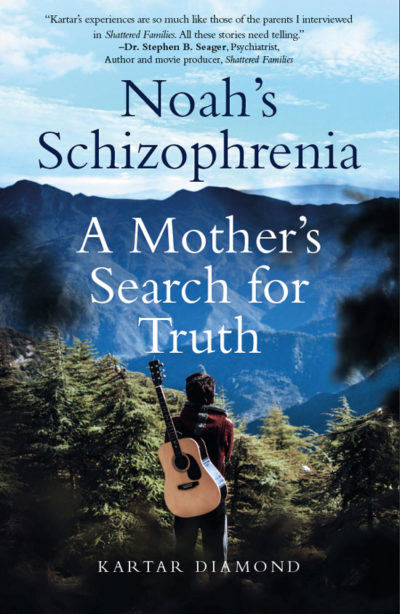Noah’s Schizophrenia: A Mother’s Search for Truth
The author recounts her and her son’s experiences over a thirteen year period, after his schizophrenia emerged at age fifteen. Mother and son go through a myriad of set-backs and insults, dealing with the dysfunctional mental health care system. It will shock the reader and give them a front row seat into how hard and heartbreaking it is to get competent professional help, even in the wealthiest country in the world. This memoir guides and consoles other family members, coping with the tragedy of their loved one having serious mental illness.
After reading Noah’s Schizophrenia, the general public will better understand how schizophrenia traumatizes not just the person with this brain illness, but also their family members who are the main caretakers (usually the mother), and who typically fight an uphill battle advocating for their loved one. Readers who are policy makers or professionals in the mental health care industry will realize they should utilize family members as part of the recovery plan, instead of shutting them out of the process.
Instead of delivering only statistics, this true story puts a human face on the toll which schizophrenia takes, and will help generate more activism on behalf of those who don’t have the ability to advocate for their own cause. When the author speaks in front of law enforcement as part of their Crisis Intervention Training, the officers tell her that Noah’s personal story has completely changed how they will handle mental health emergencies in the future. The author is painfully candid, sharing both mistakes made and triumphs, so that fellow family members can avoid the same land mines in dealing with mental health care providers and seek out the resources available in their community.
The author includes conversations she has with her son as a fascinating backdrop to how he thinks and perceives the world. They are often in stark contrast to his disturbing behaviors.
Anyone with a loved one experiencing mental illness will identify with this memoir, especially the parents of those with schizophrenia. Schizophrenia plagues about 1% of the population. Just in the United States alone, that means that over 3 million people with 6 million mothers and fathers trying to cope with this tragedy.
Siblings and other extended family members bring the total amount of people directly impacted by schizophrenia well into the tens of millions, not to mention 150 billion dollars yearly in health care costs. Schizophrenia is still so stigmatized, that family members often suffer in silence, developing their own PTSD, anxiety and depression because of their overwhelming circumstances. It can be very therapeutic just to know that you are not alone and the practical advice is also invaluable.
Psychiatrists, psychologists, nurses, social workers, case managers, peer coaches, in-patient and out-patient staff and coordinators, Board and Care operators, mental health court judges and many others in the field can all benefit by a holistic understanding from the parent’s perspective, in how their decisions and actions can hasten or delay the stability of their patients.
While there are many sincere and expert mental health care professionals, some are handcuffed by the limitations of insurance coverage or arcane laws, preventing them from even using their own skill set optimally. Others have been misdirected into believing that parents are to blame; Noah’s Schizophrenia gives many examples of how that stereo-type needs to be retired if we truly want to see more successful outcomes.
Inquisitive and intuitive people working in the mental health care industry will read this book to give them additional insight into the family dynamic. They may already sense, and just need a little more validation, that input from and collaboration with parents could be a game-changer in their own effectiveness as a professional in the field.
With rising homeless populations, more people needing government assistance, alarming numbers of mass shootings, and overflowing prisons, the general population from all walks of life is starting to realize that socio-economic reasons are only part of the equation. Un-treated mental illness is a big part of the equation and everyday people are now taking an interest in this chronic public health emergency. We can’t have too many citizens demand that their local, state, and federal officials make the accessible treatment (and sometimes involuntary treatment) of mental illness a priority.
Over 20% of the general population has experienced some form of intermittent or less debilitating mental illness than schizophrenia. Post-traumatic stress disorder, anxiety and depression are fairly common compared to 1% of the population who are seriously mentally ill and often lacking insight. Most people know someone with a serious mental illness and this memoir will be attractive to readers who want to understand schizophrenia in layman’s terms. Even friends of family members are curious about this brain disease, but are afraid to ask certain questions deemed too personal. Noah’s Schizophrenia: A Mother’s Search for Truth can fill that void.



